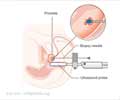A recently discovered cellular protein can be used to treat prostate cancer. The protein ubiquitin when attached to the EGFR, can cause degeneration of cell.

‘When the researchers used signal-transducing adaptor protein-2 (STAP-2), the prostate cancer cells did not form into a tumor, which could potentially make the STAP-2 inhibitors play a role in treating Gefitinib-resistant prostate cancers.’





EGFR, present on the cell membrane, is involved in cell proliferation and the development of dermis, lung, and digestive tissues. When a mutation causes its over-activation, it can lead to increased cell proliferation and tumor formation.Tadashi Matsuda of Hokkaido University and his colleagues in Japan investigated human prostate cancer cells to determine if there is an unknown up-regulation mechanism in the EGFR pathway.
When EGFR is attached to a small protein called ubiquitin, it is given "the kiss of death" and tagged for degradation inside the cell. This tagging process is facilitated by a protein called c-CBL.
The degradation of EGFR leads to less signaling from the receptor and reduced cell proliferation.
Matsuda and his team found that signal-transducing adaptor protein-2 (STAP-2) stabilizes EGFR by inhibiting its c-CBL-mediated ubiquitination.
Advertisement
"STAP-2 inhibitors could play a role in treating Gefitinib-resistant prostate cancers. Further studies on STAP-2 will provide new insights into cancer physiology and support the development of anticancer therapies," says Tadashi Matsuda.
Advertisement
Source-Eurekalert


![Prostate Specific Antigen [PSA] & Prostate Cancer Diagnosis Prostate Specific Antigen [PSA] & Prostate Cancer Diagnosis](https://images.medindia.net/patientinfo/120_100/prostate-specific-antigen.jpg)












